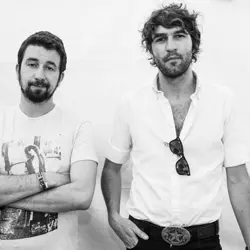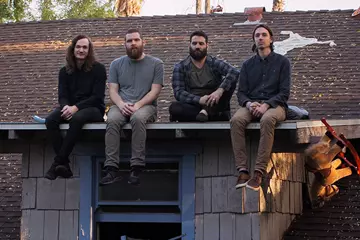 Japandroids
JapandroidsEven though they'd been plugging around for a few years in their native Canada, for most global music fans Vancouver duo Japandroids burst into their consciousness back in 2009 with their debut album Post-Nothing, a maelstrom of urgent, shouty rock'n'roll that sounded as fun and assured as it did visceral and chaotic. That album was meant to be a valediction of sorts, the pair – Brian King (guitar/vocals) and David Prowse (drums/vocals) – having become disillusioned with the band's prospects and deciding to break up as they released it, planning to do little or no promotion other than just putting the already completed record out independently and then moving on.
Nonetheless, the powerful album found its way to the right ears and soon began to get traction online and beyond, and suddenly Japandroids were touring the globe at a frantic rate of knots, demand for their frenetic live show outstripping their capacity to be in that many places at once. When it came to write and record the inevitable follow-up, this fairytale experience didn't inspire confidence, rather trepidation that they wouldn't be able to repeat the magic.
“I really don't know how it could have been more different for us,” King muses of the process which resulted in their excellent second effort, 2012's Celebration Rock. “When we were working on Post-Nothing we were no different to than if you and your friends decided to start a band for fun – there was no one to make the record for except yourself. We didn't have any ambition... That's not fair to say, it was more that we didn't expect anyone besides us to hear it. We didn't have an audience – we'd play shows and there would be ten people there and they'd all be our friends, and they'd all be there out of guilt. You're just kind of making a record for yourself for the fun of it – it's music in its purest form.
“Then when it came time to write songs for Celebration Rock everything was totally different – we had an audience now, we had expectations, we had a record label, we knew that people were going to review the record. You have all of these other things to think about when you sit down to write a song, other than just, 'Do you think this rocks?' And it can be pretty difficult when you're faced with that for the first time, because you have to figure out some way to just shut it all out and do what you did the first time. There was a lot of second-guessing ourselves and a lot of doubt. We had such a good time touring on Post-Nothing and playing those songs for people, and there's definitely a feeling that if you can't do something that's as good or better than that then someone's going to take that away from you and you're not going to be able to play shows for people anymore. There were times when it was really, really fucking miserable, because I especially couldn't find a way to just sit down and block all of that stuff out of my head and just write a song. We eventually figured out a way to do it, but in the beginning, especially before we had any songs, getting started was really difficult.”
Don't miss a beat with our FREE daily newsletter
Nothing changed in Japandroid's personnel or approach between the two albums, rather it's a barely perceptible attitudinal shift which makes Celebration Rock a completely proposition than its predecessor, although King is quick to stress that none of this was planned in advance.
“We're not smart enough to decide that we're going to make an album, plan it out and then execute it,” he laughs. “I mean one of our ideas when we first started talking about making Celebration Rock was actually to do a record like Pink Flag by Wire or Zen Arcade by Hüsker Dü or Double Nickels On The Dime by Minutemen – have a lot of songs but be really, really short. Almost like the opposite of Post-Nothing, where we'd have a thirty-five or forty-minute record but with twenty songs which are all two minutes long. So if you think about it, if that was the initial plan that we wanted to do we completely and totally and utterly failed at executing that plan because we came out with a record that ended up just like Post-Nothing, eight songs in thirty-five minutes.
“No, the only kind of plan we had was that a song wasn't done until we felt like there was nothing more that we could possibly do to it to make it any better or any more fun to play. If we thought that we could squeeze something more into it, or if I thought that the lyrics could be even better or if I thought that it could be even more rocking or whatever then we kept on working at it – kept grinding away – and so after a while the songs just started to kind of accumulate and we started to see the kind of record we had.
“Close to the end we could kind of see what we'd actually come up with, and the last song on the record, Continuous Thunder, that was the last song that we wrote because at some point you say, 'Okay, we've got nearly thirty minutes of music, and it's all kind of amped to eleven' so we thought that we should try to have maybe one song that's not just a blitzkrieg from start to finish.”
Celebration Rock's good-time anthems about fun and hedonism are appropriately frantic and noisy but also ultimately uplifting and inspiring, an unintended consequence of the band following their gut instincts.
“I think to some extent it's just natural – it just a reflection of the music that we listen to, and a reflection on the music that we're interested in playing,” King posits. “It's certainly not a conscious thing – I don't think we're really capable of making music that's really sad or really angry or anything like that. I don't think we have an interest in playing that – maybe if we tried really, really hard we could write a sad song or an angry song, but there's no way we could end up with the whole band sounding like that. The type of shows that we play and the feeling that we have when we play music is just really fun and really celebratory –we love it so much and I think that's inherently reflected in the kind of songs that we end up working on. I would say that most of the bands that are the primary influences that you hear in our music are ones where if their music isn't immediately uplifting, what they do to you when you listen to it is uplifting. We wanted to do that same thing to our fans, and give them that same feeling and experience that those bands give to us.”
Japandroids will be playing the following dates:
Friday 1 February - Laneway Festival, Brisbane QLD
Saturday 2 February - Laneway Festival, Sydney NSW
Sunday 3 February - Laneway Festival, Footscray VIC
Friday 8 February - Laneway Festival, Adelaide SA
Saturday 9 February - Laneway Festival, Perth WA















